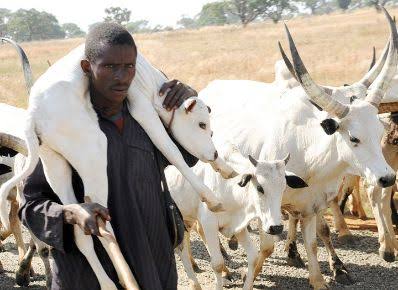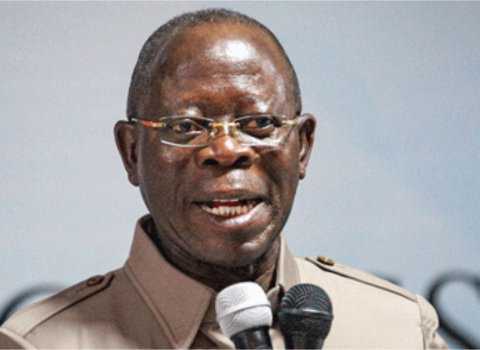In what looks like a half-solved problem or the difference between six and half a dozen, the Livestock Committee set up by the federal government to find a lasting solution to the incessant clashes between herdsmen and farming communities across Nigeria, has recommended the retention of the contentious open grazing practice of the herdsmen as part of an integrated solution to the problem.
Co-Chairman of the Livestock Reform Committee, Attahiru Jega on Thursday advocated for integrated solutions to the pastoral issues facing the nation, stating that any current approach to solve pastoral crisis in Nigeria must combine open grazing and ranching, arguing that this arrangement should subsist while the Federal government promotes a long term objective of intensive livestock production in Nigeria.
Briefing State House Correspondents at the Council Chamber, after submitting a 152-page report on livestock reforms in Nigeria, Jega who was accompanied by three other members of the committee, explained that part of the reasons the committee is promoting a long term objective is to eventually achieve an intensive livestock production.
He added that policies and frameworks that would accommodate both ranching and open grazing for a period of time while increasing awareness against the extensive nature of pastoralism should be encouraged.
“You cannot wake up tomorrow and all you have is ranching because you have already had quite a large chunk of population in traditional pastoral activities, what do you do with them is not either nor but any solution that has to be developed now has to be a combination of both,” he said.
“Why we are promoting long term objective is that we now have live stock production but you know you cannot wake one day and have that, you have to develop policies and frameworks that can accommodate both for a period of time while the objective is to have intensive livestock production and not to have extensive in the nature of pastoralism that we have now.”
Jega’s recommendations come against the backdrop of many anti-open grazing acts already passed by several States of the federation, which acts are supported by legal precedents and extant provisions of the constitution.
More importantly, experts have noted that to become effective, any federal law enacted in line with the recommendations of the Livestock Reform Committee must first dispense with the Land Use Act in the Constitution, which invests ownership of the lands, held in trust for the communities, in state governors.
Jega further suggested a time frame of policy re-caliberation of pastoralism so as to achieve incremental positive changes in the livestock sector.
“I think some of the challenges we have heard in the past has led to the politicisation of the issue is that we are quick to develop a single frame.of mind as regards what the solution is but in a complicated situation that we have to really think in terms of incremental positive changes, we have to really have a time frame within when these will be achieved,” the former INEC Chairman said.
The Livestock Reforms Committee also presented a 152-page inception report to President Tinubu, detailing several achievable targeted indicators within a 10-year time frame, that would inform major reforms in the livestock sector of Nigeria.
He explained that the committee proffered recommendations on the set up of the Federal Ministry of Livestock development with detailed guidelines on the establishment of the Ministry.
The Co-Chairman of the Committee also stated that with the presented report, Nigeria would begin to address some of the challenges facing its livestock sector.
National Project Coordinator Livestock Productivity and Resilience Support Project, Winnie Lai-Solarin stated that recent National Agricultural sample census and the projections by the Federal Department of Animal Husbandry services, as quoted by the National Bureau of Statistics 2022, revealed that Nigeria has a total of 563 Million poultry, 600 million sheep, 124 million goats, 58 million cattle, 16 million pigs.
She added that this provides huge opportunities for investors.
“You can imagine the volume of investment you have in the feed industry so investors in the livestock sector, with this pronouncement by Mr President, with this number, Nigeria has the highest number of livestock in West Africa, and we are about the fifth in the whole of Africa,” she enthused.
“Poultry alone has over 1.7 trillion investment. And what the reforms that we have put in place and the reforms we are proposing will try to do is to move the ruminant side from moving them from 1% in intensive production. Only 1% of our ruminants are read intensively, about 85% extensively. So what does that tell you? 85% are in the hands of the pastoralists.
“So, the reform is to gradually move and spread that production system like we have in the poultry sector, where you have 31% intensively, right? If we can balance it, like the co chair has said, it is not either or balancing and moving easily so that you have reduced the number of animals held extensively and then bringing investors to assure economic growth by investing in these different sectors and the different value chains that you have in the larger sector.”
President Tinubu had on July 9th 2024, inaugurated the Presidential Committee on Implementation of Livestock Reforms to address obstacles to agricultural productivity and open up new opportunities which benefit farmers, herders, processors and distributors in the livestock-farming value chain.



























